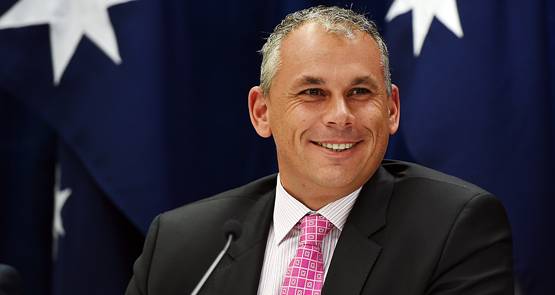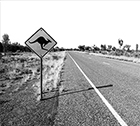
“Ship of fools on a cruel sea, ship of fools sail away from me.
It was later than I thought, when I first believed you,
Now I cannot share your laughter, ship of fools.”— Ship of Fools, From the Mars Hotel, Grateful Dead
The Northern Territory has been effectively ruled by a troika — Adam Giles, Dave Tollner and John Elferink — since the ugly coup in March 2013 that installed Giles as leader of the NT’s Country Liberal Party government, which Terry Mills had led out of 11 years of opposition wilderness just eight months before.
If you’d listened to the CLP’s fanboys and girls in the media and elsewhere at the time, they would have you believe that this revived CLP heralded some kind of new era in NT politics. For them, the CLP had forever broken Labor’s grip — always tenuous at best, for mine — on black votes in the bush.
The clever targeting of Labor’s bush seats in the August 2012 general election (a resounding chapeau! to Mark Textor) and the success of indigenous CLP candidates Larisa Lee (Arnhem), Alison Anderson (Namatjira), Francis Xavier Kurrupuwu (Arafura) and Bess Price (Stuart) was smart campaigning that took advantage of a Labor Party grown fat and lazy after 11 years in power.
From a strong 2012 majority of 16 seats in the 25-seat NT Legislative Assembly the CLP is now reduced to a minority government scrabbling for votes on the floor of the Assembly like a drunk begging for coins inside the animal bar at the Todd Tavern.
Anderson, Lee and Kurrupuwu left the CLP to join Clive Palmer’s local iteration of the Palmer United Party but, following the wholly predictable collapse of PUP in the NT, Kurrupuwu rejoined the CLP. Lee, once a firm ally of Anderson, now votes with the CLP while remaining, notionally at least, on the crossbenches. Anderson is one of six backbenchers who between them hold the balance of power in the Legislative Assembly.
Never able to settle or give itself clear air, the Giles government has been an unfortunate role model for political chaos from day one.
As Nicolas Rothwell observed in February this year in The Australian:
“The regime that replaced Mills never escaped the shadow of its initial act of political assassination: it rewarded loyalists, and gave ministerial posts to incompetents; it fomented a cult of personality, and abused parliamentary procedures with abandon. It was addicted to propaganda, and surrounded by the murk of scandals … In short, all the darkest characteristics of a dictatorship were able to flourish in a provincial government despite the continuing semblance of democratic procedure.”
Nothing has improved in the intervening months. Internal CLP polling obtained by The Northern Myth shows that the CLP knows it is in deep trouble, and while the electorate’s contempt for the government is manifest, it is the troika of Giles, Tollner and Elferink that are the primary targets for the electors’ Louisville sluggers.
That polling conveniently collects results from large-sample telephone polls (a rarity in the NT) taken in April 2014, and February, June and mid-November 2015.
The CLP’s primary vote has declined from a high — if you can call it that — of 39% in April 2014 to a current low of 28%. Two-party preferred results are no better, with the CLP slipping from a 47% to 53% margin to Labor in April 2014 to a margin of 42% to 58% earlier this month.
In the preferred chief minister stakes, Giles is 19 points behind Labor’s Michael Gunner, who only took over the job of opposition leader when previous leader Delia Lawrie was dumped earlier this year.
And 68% of those polled reckon that the CLP doesn’t deserve to win the next election.
Notwithstanding the accepted wisdom that selling off both the government-owned TIO insurance company and the long-term lease of the Darwin port was wise economics, 68% of voters said no to the question “Did the CLP do the right thing selling TIO?” The response on leasing the Darwin port was also strongly negative, at 64%.
But over the last few weeks, this bad news for Giles and the CLP has only been aggravated by their own continued political clumsiness.
Two weeks ago, leader of government business John Elferink led the charge in a bungled attempt to unseat the popular Speaker of the Assembly — and recent CLP defector — Kezia Purick. The next day, Elferink announced that he would not stand at the next election.
On Friday last week Elferink announced the postponement of the introduction of “Daniel’s Law”, legislation that would publicly identify sexual offenders and that he had trumpeted as a central plank of the CLP’s law-and-order agenda for the next election.
On Saturday last, the CLP’s central council met to determine the preselection of candidates for the 2016 election. Two candidates, Treasurer Dave Tollner and backbencher Lia Finocchiaro, stood for preselection for the new, nominally safe CLP seat of Spillett in the Darwin suburbs.
Following the recent redistribution by the NT Electoral Commission, Tollner’s majority in the seat of Fong Lim had shrunk from a reasonably safe 7.3% to a miserable 0.2%, so it was no surprise that he was looking for a safer perch. Finocchiaro’s current seat of Drysdale in the satellite city of Palmerston had also been affected by the redistribution, but less so than Tollner’s in Fong Lim.
The word was that Tollner, as a senior member of the government, and with nearly 15 years’ experience in federal and local politics, would be a shoo-in for Spillett. But the CLP party wing thought otherwise and dumped Tollner — who did not nominate for his current seat of Fong Lim or any other — in what can only be seen as a swingeing whack in the face to Giles and the CLP parliamentary wing by a party wing in open revolt. The CLP party wing, like the electorate, appears to have stopped listening to Giles and his crew and taken their own direct action.
How did it get to this? The CLP came to government with a reasonably healthy economy, low unemployment and a relatively placid political environment that continues to date.
But much of that good news will evaporate once the massive INPEX gas project in Darwin harbour scales down its construction phase through to mid 2016. That will bring about the departure of thousands of workers and the emptying of hundreds — if not more — of Darwin apartments, with corresponding economic knock-on effects.
And while unemployment is low, the official figures do not reflect the chronic underemployment of indigenous Territorians, particularly in remote and regional areas. Those regional areas are doing it tough in other ways. Mining activity — exploration and excavation — has shrunk, and economic activity in the many small towns scattered across the territory is barely above subsistence level.
I’ve lived in the NT for more than 30 years and have seen dumb governance — and governments — of both political stripes. But for all the brief time that the NT has been a self-governing polity, I have never seen a government so determined to sink its own boat.
The next few days won’t make life any easier for the CLP. Today, at the start of the final three days of sittings for the year, NT Labor will bring on a no-confidence motion in the Legislative Assembly against the Giles government.
Labor’s motion will fail, but on Wednesday Speaker Kezia Purick — in her capacity as the member for Goyder — will propose a referral of Giles and others to the Parliamentary Privileges Committee over the controversial “ice ads” the government ran in the NT News, which, as far as Labor and the independents are concerned, fundamentally misrepresented their votes in the Assembly.
Add into this mix rumours of moves against Giles as chief minister, a possible ministerial reshuffle (rejected by Giles yesterday, but … ) plus the very limited prospect of smooth sailing anytime soon, and it makes for an intriguing silly season ahead.
Territory politics: it may often be very stupid and very annoyingly small-towny, but it is rarely boring.








Crikey is committed to hosting lively discussions. Help us keep the conversation useful, interesting and welcoming. We aim to publish comments quickly in the interest of promoting robust conversation, but we’re a small team and we deploy filters to protect against legal risk. Occasionally your comment may be held up while we review, but we’re working as fast as we can to keep the conversation rolling.
The Crikey comment section is members-only content. Please subscribe to leave a comment.
The Crikey comment section is members-only content. Please login to leave a comment.